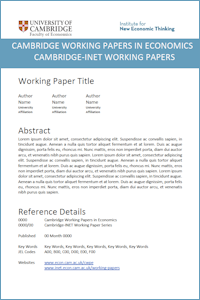
Brotherhood, L., Cavalcanti, T., Da Mata, D. and Santos, C.
Slums and Pandemics
CWPE2076
Abstract: This paper studies the role of slums in shaping the economic and health dynamics of pandemics. Using data from millions of mobile phones in Brazil, an event-study analysis shows that residents of overcrowded slums engaged in less social distancing after the outbreak of Covid-19. We develop a choice-theoretic equilibrium model in which poorer agents live in high-density slums and others do not. The model is calibrated to Rio de Janeiro. Slum dwellers account for a disproportionately high number of infections and deaths. In a counterfactual scenario without slums, deaths increase in non-slum neighborhoods. Policy simulations indicate that: reallocating medical resources cuts deaths and raises output and the welfare of both groups; mild lockdowns favor slum individuals by mitigating the demand for hospital beds whereas strict confinements mostly delay the evolution of the pandemic; and cash transfers benefit slum residents in detriment of others, highlighting important distributional effects.
Keywords: COVID-19, Health, public policies, slums, social distancing
JEL Codes: E17 I10 I18 D62 O18 C63
Author links: Tiago Cavalcanti
PDF: https://www.econ.cam.ac.uk/research-files/repec/cam/pdf/cwpe2076.pdf 
Open Access Link: https://doi.org/10.17863/CAM.61836
Published Version of Paper: Slums and Pandemics, Brotherhood, l., Cavalcanti, T., Da Mata, D. and Santos, C.
, Journal of Development Economics (2022)
<< CWPE Home | CWPE List 2020 >>
